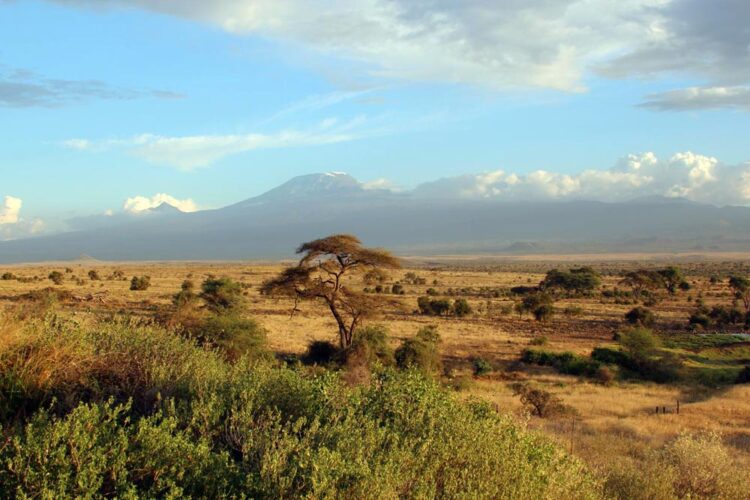Seasonal Forecasts Improve Food Supply

The Kilimanjaro dominates the landscape of East Africa. There, impacts of climate change can already be felt clearly.
(Photo: Harald Kunstmann, KIT)
EU project CONFER started – precipitation forecasts reduce the impacts of droughts and floods in East Africa.
Developing more precise seasonal forecasts to improve food supply for a total of 365 million people in eleven countries in East Africa, this is the goal of the new CONFER project funded by the EU. In particular, more precise precipitation forecasts are deemed important to increase agricultural yields. Karlsruhe Institute of Technology (KIT) is one of nine partners of this international project that is funded by the European Union with a total amount of EUR 7 million.
In 2017, East Africa was affected by the most severe drought since more than half a century. In 2019, heavy precipitation produced widespread flooding within a short term. Entire regions were covered by a waist-high layer of water. Both events produced big damage in agriculture and infrastructure and represented existential threats to the population. “In East Africa, the impacts of climate change can already be felt clearly,” says Professor Harald Kunstmann, Deputy Head of the Atmospheric Environmental Research Division of KIT’s Institute of Meteorology and Climate Research (IMK-IFU), KIT’s Campus Alpine in Garmisch-Partenkirchen. The Institute participates in the new EU project CONFER (Co-production of Climate Services for East Africa). The project started on September 01 and will have a duration of three and a half years. Research institutions, in close dialog with stakeholders and end users, will develop innovative climate services for energy, water, and food supply to support people in East Africa in coping with the challenges associated with climate change. A total of 365 million people in eleven countries in East Africa will profit from the findings.
Researchers Pool Data from Models, Satellites, and Measurement Stations
The international project coordinated by the Norwegian Research Centre (NORCE) is aimed at increasing the accuracy of forecasts for the next months and supplying various weather and climate data for the region. In countries like Kenya and Tanzania, where reservoirs and water power play an important role in irrigation and energy supply, improved control may contribute to increasing agricultural yields and reducing flooding risks.
“In CONFER, we use dynamic and statistical forecast models as well as methods of machine learning and pool data from models, satellites, and measurement stations,” explains Kunstmann, who heads the “Regional Climate and Hydrology” Group of IMK-IFU. “Above all, we seek to improve seasonal forecasts, i.e. forecasts for several months. This will enable us to take measures in due time in order to reduce negative impacts of droughts or extremely wet periods.”
###
CONFER is funded by the European Union with a total of EUR 7 million under its Horizon 2020 Framework Programme for Research and Innovation. Apart from NORCE and KIT, other project partners are the Norwegian Refugee Council, Norwegian Computing Center, IGAD Climate Prediction & Applications Centre (ICPAC, Kenya), Kenya Red Cross Society, University of Cape Town (South Africa), University of Leeds (UK), and Met Office (UK).
More about the KIT Climate and Environment Center:
http://www.
Press contact:
Sandra Wiebe
Press Officer
Phone: +49 721 608-41172
Email: sandra.wiebe@kit.edu
Being “The Research University in the Helmholtz-Association,” KIT creates and imparts knowledge for the society and the environment. It is the objective to make significant contributions to the global challenges in the fields of energy, mobility and information. For this, about 9,300 employees cooperate in a broad range of disciplines in natural sciences, engineering sciences, economics, and the humanities and social sciences. KIT prepares its 24,400 students for responsible tasks in society, industry, and science by offering research-based study programs. Innovation efforts at KIT build a bridge between important scientific findings and their application for the benefit of society, economic prosperity, and the preservation of our natural basis of life. KIT is one of the German universities of excellence.
This press release is available on the internet at https:/
Media Contact
All latest news from the category: Earth Sciences
Earth Sciences (also referred to as Geosciences), which deals with basic issues surrounding our planet, plays a vital role in the area of energy and raw materials supply.
Earth Sciences comprises subjects such as geology, geography, geological informatics, paleontology, mineralogy, petrography, crystallography, geophysics, geodesy, glaciology, cartography, photogrammetry, meteorology and seismology, early-warning systems, earthquake research and polar research.
Newest articles

First-of-its-kind study uses remote sensing to monitor plastic debris in rivers and lakes
Remote sensing creates a cost-effective solution to monitoring plastic pollution. A first-of-its-kind study from researchers at the University of Minnesota Twin Cities shows how remote sensing can help monitor and…

Laser-based artificial neuron mimics nerve cell functions at lightning speed
With a processing speed a billion times faster than nature, chip-based laser neuron could help advance AI tasks such as pattern recognition and sequence prediction. Researchers have developed a laser-based…

Optimising the processing of plastic waste
Just one look in the yellow bin reveals a colourful jumble of different types of plastic. However, the purer and more uniform plastic waste is, the easier it is to…



